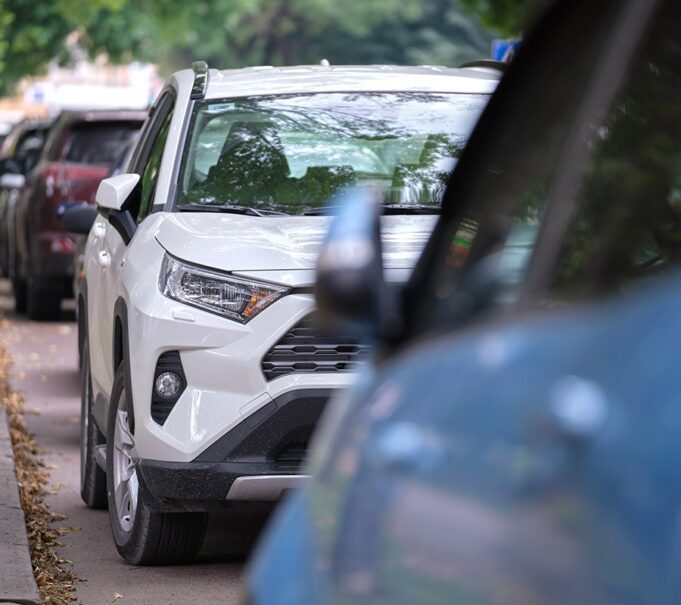Written by Spectrum AM
Community streets crowded with parked vehicles can create visibility and maneuverability issues that make driving to and from your home difficult. It’s harder to see children playing on the sidewalk and move past oncoming traffic if cars are lined up along each side of the road.
That’s why, in this article, we’ll give tips to help board members figure out what authority they have to alleviate parking problems in their community.
Determine Whether Community Streets Are Private or Public
The first step an association needs to take before creating or enforcing any parking rules is to contact the association’s attorney to determine whether the association’s streets are public or private.
If the streets are public, this means that they are owned and maintained by the city or county, not the HOA. So, the association will not have much authority over parking on public streets. In this case, homeowners will typically need to contact city or county services for assistance with vehicles that are parked illegally, such as cars blocking their home’s driveway or parked in front of fire hydrants or stop signs.
However, if the association’s streets are private, this means that the association owns or is at least responsible for maintaining them and will have more authority over where and how people can park on the streets. But, even in this case, the association will still need a clear parking policy that follows the association’s governing documents and state law to enforce parking rules in the community.
Check Your Governing Documents
Once the association has determined whether the roads are public or private, the next step is to review the governing documents to see what authority the association is granted over parking in the community. Parking rules are typically listed in the CC&Rs, and the association should not enforce parking rules or levy fines that are not permitted by the governing documents. Homeowners cannot be held to follow rules that are out of compliance with the governing documents of the association.
Create & Approve a Parking Policy
If the parking rules in the association’s governing documents are vague, it is typically a best practice to create a parking policy. As long as the rules in the policy do not contradict the governing documents, the association can clarify rules by adding specifics.
For instance, if the CC&Rs say that “vehicles cannot be parked overnight on community streets,” the parking policy could clarify the rule by stating that “vehicles cannot be parked on community streets from 11:00 p.m. to 6:00 a.m.” By defining what is meant by “overnight” in measurable terms, the parking policy makes the association rule much easier to enforce fairly.
The association’s attorney can help the board draft a document that is both in line with state law and the governing documents and is enforceable. Remember that the association must be granted the power to fine in the governing documents to fine homeowners for breaking parking rules.
Hire Professionals to Enforce Parking Rules
The tricky thing about parking policies is that enforcing them fairly involves constant monitoring of the community, which isn’t something volunteer board members, or even most management companies, can do effectively. For large communities, it’s a full-time job for several people to catch illegally parked vehicles and consistently monitor the community. They would need to be able to tell whether a car has been left parked on the street overnight or simply parked for a couple hours in the evening and a couple hours the next morning.
Hiring professionals to enforce the association’s parking policy is usually the best practice to ensure that rules are enforced fairly and equally. Your board worked hard to create a fair parking policy – don’t let inequitable enforcement undo all that good work.
Help Homeowners Find Parking
There are certain times during the year that neighborhoods are flooded with vehicles: Thanksgiving, the winter holidays, and Memorial Day weekend are just a few. And, this doesn’t include important family events typically held at home, such as bridal showers, graduation bashes, and birthday parties.
For times like these, the board should be ready with parking solutions to help keep the streets clear and drivable while accommodating for guests. Here are a couple tips the board can use:
Offer Community Bulk Pick-Ups. Make it easy for homeowners to clear out their garages. Coordinate a bulk pick-up for association members twice a year, so they can drag their junk and empty boxes to the curb to dispose of them. With the homeowner’s cars back in the garage, that should free up a couple more parking spots on the driveway for guests!
Offer the pool parking lot for holiday visitors. Since the community pool is closed during fall and winter, the parking lot will be empty and ready for out-of-state aunts, uncles, and grandparents to use during their stay.
With diligence and attention to detail, your association can use equitable parking rules to clear up streets and help keep pedestrians and drivers safe. If you want more information about parking rules and how to solve specific parking issues in your community, please reach out to your community manager.
Shared from Spectrum Management











